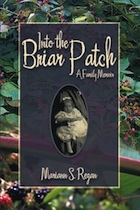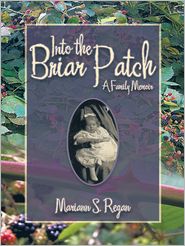 What do you do when you find unspeakable things in your family history? How do you handle the accurate reporting of what happened? It’s easy to judge others, but I think a fundamental key to really reconstructing your ancestors’ lives is to not judge them. It’s paramount to take a step back from your emotional reaction, and walk in their shoes for a little while. To do this does not mean you approve of everything your ancestors did in their lifetimes, but it allows you to freely explore as much as you can of their lives. In doing this, a researcher can get a more accurate picture of the conditions in which your ancestors lived in and the circumstances in which they went through. In her book, Into the Briar Patch: A Family Memoir, Mariann S. Regan does a superb job dealing with difficult family history issues. At the beginning of her book, she promises the reader that she will be objective with all information she finds, and she lives up to that promise. She delves into all family relationships she encounters in her family tree and shows the reader the complexities of family relationships. Additionally, Mariann explores her ancestors who were slaveholders, and gives the reader a glimpse as to the repercussions of slaveholding on her family tree and the relationships contained therein. As we’ve seen in several episodes of Who Do You Think You Are? and in the first two episodes of Finding Your Roots, it is not easy for descendants to learn their ancestors were slaves nor is it easy for descendants to learn their ancestors were slaveholders. And I believe in her memoir Mariann takes it past her emotional reaction and carefully looks at her slaveholding ancestors - not to condone the actions - but to fully understand the influence these actions have had on her family tree. I highly recommend this book to anyone, but especially those who have come across unspeakable circumstances and actions in their family history research, and especially to those who have come across ancestors who were slaveholders. Not only does she give a great example as to how to explore this difficult issue, but her "Works Cited and Selected Bibliography" might be helpful to the researcher as well. I invite you to visit Mariann’s website as she has written in other genres as well. She also indicates on her memoir page that she is in the process of writing another memoir, and she includes the surnames of the ancestors that she is currently researching for it. Personally, I would like to know from where her Sanders line originates in America as I have a Sanders line as well from the Massachusetts Bay Colony. Thus, I’m eagerly awaiting her next memoir. ~Caroline Note: I am an affiliate of Amazon.com and Barnes and Noble. If you click on a link ~ image or text ~ and purchase a copy of the book, I will receive a small commission for referring you. I received a copy of this book from the author so that I may review it and share it with you. Additionally, all opinions stated in my book review are honest and not contrived to make you purchase the book. I happen to love reading. I love history, especially family history. I enjoyed reading this book, and I thought you might like it as well. Please visit my Disclosure Page for general information concerning my affiliations.
1 Comment
|
Categories
All
Archives
February 2017
|
|
© Copyright For Your Family Story 2016 - All Rights Reserved
|


